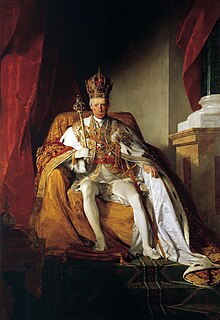Kaiser
This article relies largely or entirely on a single source. (September 2007) |

Kaiser is the German title meaning "Emperor", with Kaiserin being the female equivalent, "Empress". It is directly derived from the Latin Emperors' title of Caesar, which in turn is derived from the name of Julius Caesar. "the Kaiser" is usually reserved for the Emperors of the German Empire, the emperors of the Austrian Empire and those of the Austro-Hungarian Empire. Although the British monarchs styled "Emperor of India" were also called "Kaisar i Hind" in Hindi and Urdu, this word, although ultimately sharing the same Latin origin, is derived from the Greek Kaisar, not the German Kaiser.[1]
German history and antecedents of the title
The Roman imperial style was revived in the Frankish realm by Karl the Great or Charlemagne in 800. When his empire was divided, the title of Emperor went to the ruler holding the kingdom of Rome. Through inheritances this kingdom became part of the eastern ("German") kingdom. The Holy Roman Emperors (962–1806) called themselves Kaiser, combining the imperial title with that of Roman King (assumed by the designated heir before the imperial coronation); they saw their rule as a continuation of that of the Roman Emperors and used the title derived from "Caesar" to reflect their supposed heritage.
The rulers of the Austro-Hungarian Empire (1804–1918) were born in the Habsburg dynasty, which had provided most of Holy Roman Emperors since 1438. The Austrian-Hungarian rulers adopted the title Kaiser.
In English the (untranslated) word "Kaiser" is mainly associated with the emperors of the unified German Empire (1871–1918), in particular with Kaiser Wilhelm II, and with the emperors of Austria-Hungary, in particular with Kaiser Franz Joseph I.[citation needed]
In 1871, there was much debate about the exact title for the monarch of those German territories (i.e. free imperial cities, principalities, duchies, and kingdoms) that agreed to unify under the leadership of Prussia, thereby forming the German Empire.[citation needed] Deutscher Kaiser ("German Emperor") was chosen over alternatives such as Kaiser von Deutschland ("Emperor of Germany"), or Kaiser der Deutschen ("Emperor of the Germans"), as the chosen title simply connoted that the new emperor, hearkening from Prussia, was a German, but did not imply that this new emperor had dominion over all German territories. The second most powerful, perhaps most influential, German entity, Austria, was not part of the newly created German Empire. Consequently, after more than thirty years of discussion and debate, the German Empire was created based upon the Kleindeutsche Lösung ("Lesser German Solution") as opposed to the Großdeutsche Lösung ("Greater German Solution") or Großdeutschland ("Greater Germany").[citation needed] Additionally, the King of Bavaria, among others, conditioned joining the new Empire, under Prussian leadership, on the imperial title expressing the least degree of superiority over the rulers of the other territories, pariticularly his Kingdom of Bavaria. There have only been three Kaisers of the (second) German Empire. All of them belonged to the Hohenzollern dynasty, which, as kings Prussia, had been de facto leaders of greater Germany, together with the Kaisers of Austria. There have also only been three Kaisers of the Austrian Empire, the successor empire to the Holy Roman Empire of the German Nation (Heilige Römische Reich Deutscher Nation), and they have all belonged to the Hapsburg dynasty. The successor empire to the Austrian Empire was termed the Austro-Hungarian Empire, which had only two Kaisers, both again from the Hapsburg dynasty.
The Kaisers of the Austrian Empire (1804-1867) and of the Austro-Hungarian Empire (1867-1918) were:
- Franz I (1804-1835)
- Ferdinand I (1835-1848)
- Franz Joseph I (1848-1916)
- Karl I (1916-1918)
The Kaisers of the German Empire (1871-1918) were:
- Wilhelm I (1871–1888);
- Frederick III (1888), who ruled for 99 days;
- Wilhelm II (1888–1918), during whose reign the monarchy in Germany ended near the end of World War I.
